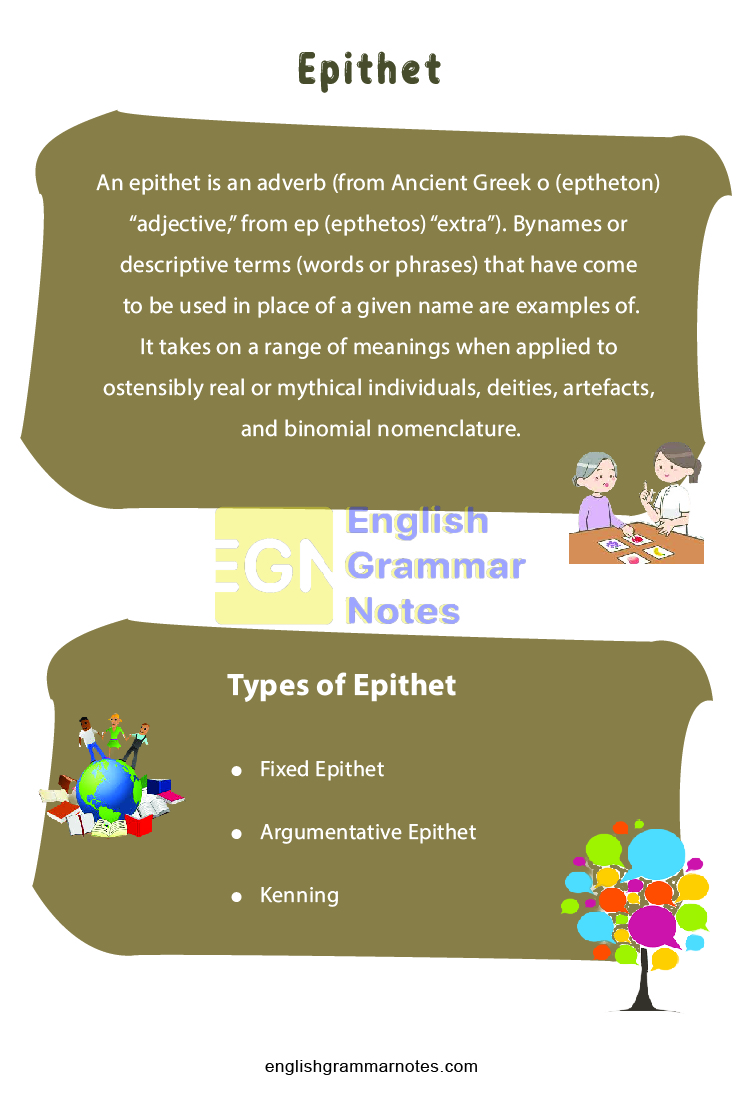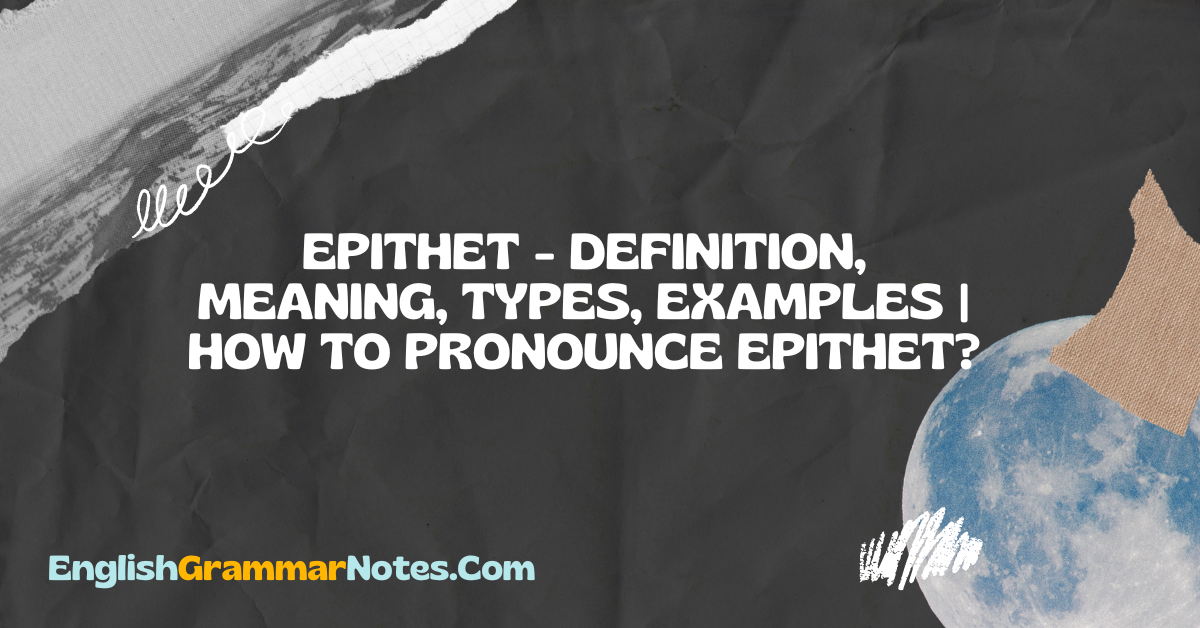An epithet is a literary device that characterizes a person, location, or object by replacing or supplementing it with a descriptive term or phrase. The word “epithet” is derived from the Greek word “epitheton” (the neuter of “epithetos”), which means “added” or “attributed.”
It is frequently repeated throughout the text to familiarise the reader with an epithet. It is also usual for epithets to appear alongside or in place of a person’s given name, like a moniker such as Catherine the Great or Ivan the Terrible. In this article, you will read about the word Epithet, its meaning, and the ways of using it in literature. So, stay tuned to learn more.
- Epithet Definition
- Types of Epithet with Examples
- When and How to use Epithets?
- Misuse of Epithets
- Is there a specific example of an epithet that you can think of?
- Is an epithet a kind of abuse?
- How do you define modern epithet?
Epithet Definition
An epithet is an adverb (from Ancient Greek o (eptheton) “adjective,” from ep (epthetos) “extra”). Bynames or descriptive terms (words or phrases) that have come to be used in place of a given name are examples of. It takes on a range of meanings when applied to ostensibly real or mythical individuals, deities, artefacts, and binomial nomenclature. It can also be descriptive, as in the cases of Pallas Athena, Phoebus Apollo, Alfred the Great, Suleiman the Magnificent, and Wadysaw I the Elbow-high.
An epithet can also be a disparaging, offensive, or obscene remark. Linguist prescriptivists like Martin Manser have taken issue with this euphemistic term application.
Types of Epithet with Examples
Learn about the many sorts of epithets and examples of epithets so that you can use them—or avoid them—more effectively:
Fixed Epithet: The term “fixed epithet” refers to a name or title that uses the same term or phrase in several contexts to describe the same person, location, or thing. In epic poetry, fixed epithets, often known as Homeric epithets, are a prevalent feature. When it comes to describing their characters, Homer’s Odyssey has Odysseus as “many-minded” and Penelope as “prudent,” while Telemachus is described as “sound-minded.”
Argumentative Epithet: This is an argumentative adverb—ominous or ominous-sounding epithets. Orators frequently utilize argumentative epithets to hint at a future outcome. If things don’t change, a lawmaker can refer to a previous conflict or skirmish, implying that the same thing could happen again.
Kenning: Metaphorically describing anything using a two-word phrase called an epithet. An Old English or Old Norse poet might use a kenning. For instance, “sky-candle” refers to the sun, while “bookworm” refers to someone who devours books.

Read More:
When and How to use Epithets?
While epithets can be effective literary devices, they aren’t always appropriately employed. Effective use of epithets draws the reader in and maintains cohesion; these epithets are the most effective.
Misuse of epithets is common when authors choose terms that describe rather than express emotion. Rather than ” demonic, ” it is better to label someone as a “hell-hound,” as Macduff does in Shakespeare’s Macbeth, rather than “demonic.” As much as “demonic” is an expression of your feelings, the term “hell-hound” gives your readers a visual representation of what you’re talking about and a cause to trust you.
Remember that many epithets are adjectives, such as “beautiful Ophelia” in Hamlet or the “wine-dark sea” in Homer’s Odyssey. However, not all adjectives are epithets, as the Oxford English Dictionary defines a descriptive word or phrase that replaces a person, place, or thing. With careful planning and strategic application, epithets can make a lasting impression on your audience’s thoughts.
If you want to improve your writing, here are some tips. This year’s MasterClass Annual Membership includes exclusive video tutorials on plotting, character development, and creating suspense, all taught by literary greats such as Joyce Carol Oates and Neil Gaiman.
Misuse of Epithets
Writers are careful when they employ epithets in modern writing and speaking. They don’t want to be accused of using racist slurs or abusive language when using this equipment.
FAQs on Epithet
1. Is there a specific example of an epithet that you can think of?
In addition to being used as a nickname, epithets like “Catherine the Great,” “Ivan the Terrible,” “Alexander the Great,” and “Richard the Lionheart” are frequently used in conjunction with a person’s given name. They’re called epitheton necessarium in Latin, and they identify the subject of the epithet.
2. Is an epithet a kind of abuse?
An insult is the most regularly used pejorative in the commercial and political worlds. As an insult and a nickname combined, “racial epithet” can refer to either a racially offensive word, name, or both.
3. How do you define modern epithet?
Epithets are descriptive terms or qualifiers used to describe attributes. If a character is being told, it can be helpful to use the Greek term “added” to describe them. Classic literary epithets, on the other hand, are an essential part of literature.
Conclusion
So, we have discussed the word Epithet in detail. We talked about its meaning, its uses in daily life, and famous works of literature. We hope you enjoyed reading our article and found it useful. Bookmark our site to know the latest updates on Rhetorical Devices and expand your grammar knowledge.
